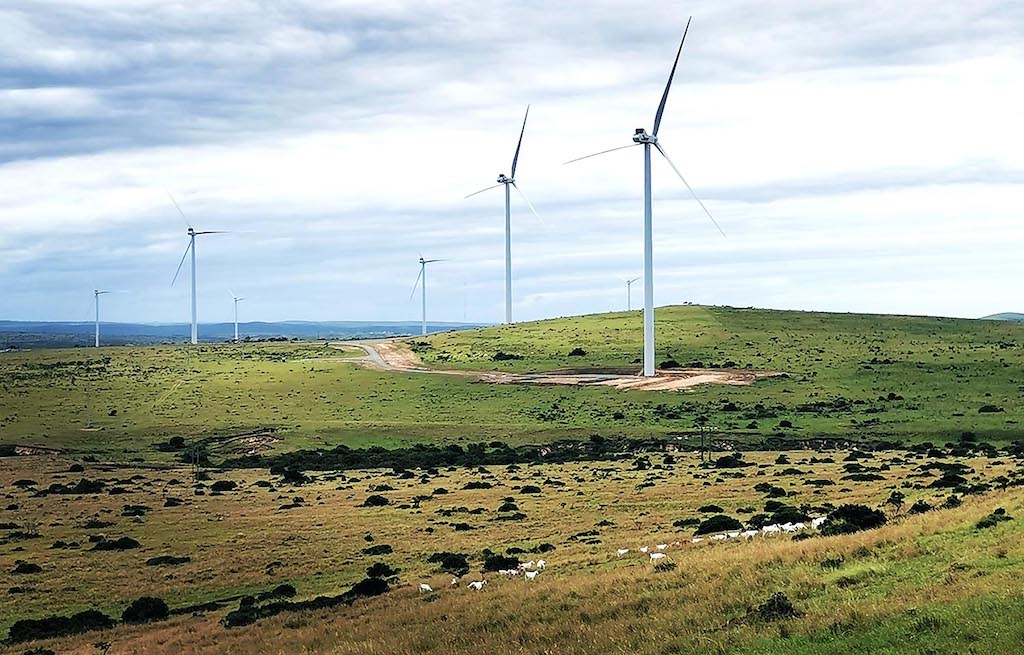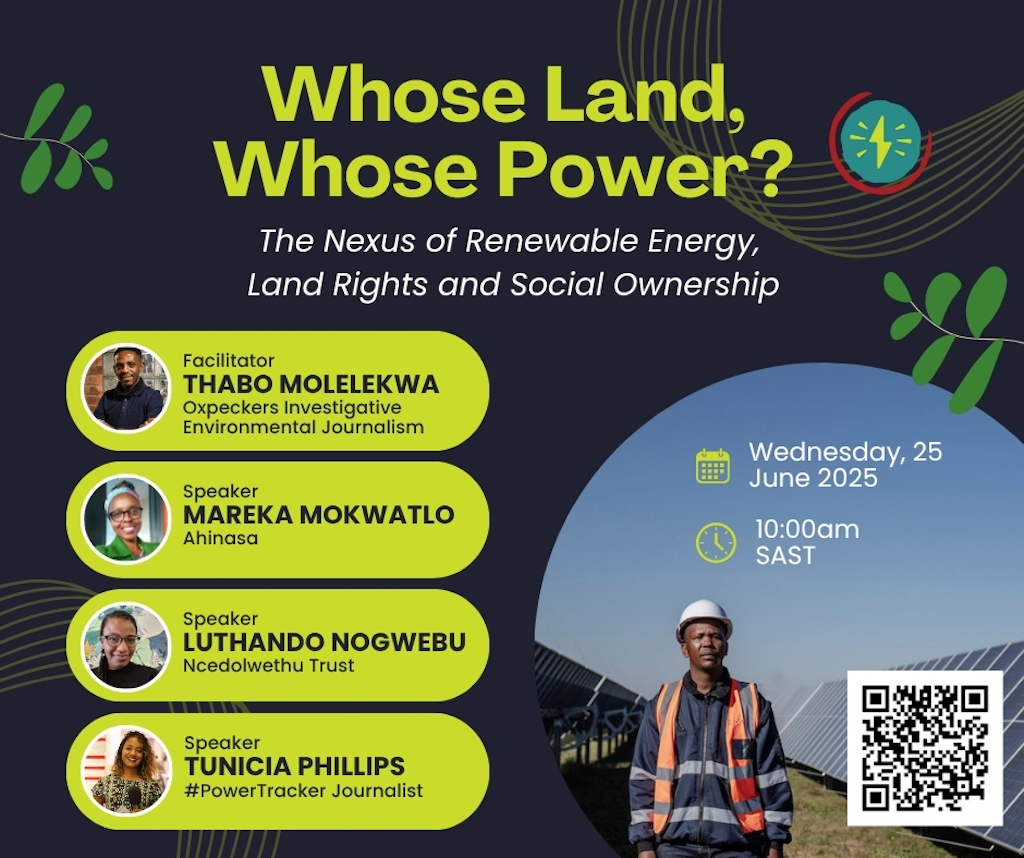
07 Jul #PowerTracker investigates community-owned renewables
What we learnt during our interrogation of land deals and social ownership of renewable energy projects. Roxanne Joseph reports

Community benefits: Selemela Solar Park benefits local communities through its corporate social responsibility programme. Pictured here is Ntabiseng Lemena, conducting sewing training in the nearby village of Grasfontein, in North West province. Photo: Ihsaan Haffejee
South Africa stands at a crossroads where the renewable energy transition intersects with historical land injustices and community empowerment. In a webinar hosted by Oxpeckers’ #PowerTracker on June 25 2025 titled Whose Land, Whose Power? we revealed how communities are fighting for – and sometimes winning – meaningful control over renewable energy projects on their land.
But how does the development of renewable energy projects in South Africa intersect with land rights and social ownership, and what are the implications for local communities and sustainable development?
This was one of the key messages that emerged during the webinar, which brought together journalists, researchers, community advocates and government representatives to share their insights and discuss how examples of community-owned projects were created, challenges they face and what this model looks like in practice.
The discussion drew from information collated for our digital mapping tool #PowerTracker, and its accompanying investigations. Launched in 2022 by Oxpeckers with support from the African Foundation’s New Economy Hub, #PowerTracker tracks renewable and coal-based energy sources across South Africa, promoting transparency and holding developers accountable to communities.
“A truly just transition centres on whether a working-class majority can secure a shift to a renewable energy economy that serves the interest of the many,” explained Oxpeckers assistant editor Thabo Molelekwa.

Community collective: The Wesley-Ciskei Wind Farm involves 11 black title deed-carrying landowners with secure land rights, and serves as an example of success community-owned renewable energy. Photo: EDF Renewables
Genuine local benefit
Socially owned renewable energy (SORE) is a model where working-class communities, cooperatives, trusts, municipalities, or public interest entities own and control energy generation.
According to community advocate, Ahinasa co-founder and panellist Mareka Mokwatlo, “SORE is rooted in equity, democratic participation, and genuine local benefit, unlike traditional private developments”.
In the discussion between webinar participants, there was a sense of needing to move beyond traditional Social and Labour Plan frameworks – which often go unfulfilled – towards “real, deep and meaningful community shareholding models that provide genuine agency over land, revenue, and long-term benefits”.
Investigative journalist and panellist Tunicia Phillips highlighted renewable energy’s unique potential to address historical wrongs: “Unlike mining, renewable energy allows communities to benefit financially without harming their land or water resources, enabling them to continue local economic activities like agriculture.”
This represents a stark departure from South Africa’s extractive history, where mining communities often saw little benefit despite policies like the mining charter intended to share wealth, Phillips said.

Local impact: On June 25 2025, the Oxpeckers #PowerTracker programme hosted a webinar for journalists, researchers, community advocates and government. Image: Oxpeckers
A long way to go
Webinar participants were asked about their take-aways from the session and many expressed a newfound understanding of community-owned renewable energy.
“What stood out for me is how land ownership is at the centre of the success of the Just Energy Transition … and the need for more advocacy around this,” said freelance journalist Marcia Moyana.
Independent energy expert Brenda Martin explained that, “We still have a long long way to go on achieving anything close to a common understanding of the challenges of development via programmes like the REIPPPP [Renewable Energy Independent Power Producer Procurement Programme] and how best to address them.”
To this point, Frank Spencer of Cainmani, an international renewable energy service provider, noted that later bid windows of the REIPPPP (BW5 to 7) “did not require local community ownership, although points for such could be scored as part of the broader ED [economic development] assessment”.
The #PowerTracker picture
Jo-Anne Smetherham from Fossil Free South Africa asked what proportion of the 800 renewable energy projects currently featured on the #PowerTracker tool are community-owned projects.
While our data shows renewables on the rise, only about 15% (124 out of 800) of the projects we have collated actively benefit local communities and just 7% (57 projects) of these include formal community trusts. For 28 of the projects, there is some form of community ownership and/or shareholding involved.
The majority of these projects are concentrated in the Northern Cape (42%), Western Cape (15%), and Eastern Cape (12%) provinces.
Examples of community-focused activities include working with a community property association that represents more than 200 black families, at the Karino Hydropower Facility in Mpumalanga; implementing an early childhood development programme by the Cookhouse Wind Farm in the Eastern Cape; and creating 4,500 jobs – with 80% filled by locals – during the development of the Kaxu Solar One in the Northern Cape.
Over the next six months, we will continue to expand our database and will keep the voices and experiences of communities at the forefront of our work.
We will keep digging into real-world examples of community ownership, and interrogate the impact they are having on affected communities.
The data driving #PowerTracker provides the foundation, but the real stories lie in how these changes affect communities, landscapes and livelihoods across the country.
You can find an easy tutorial on How to use #PowerTracker here
Spend some time digging into #PowerTracker data here
Roxanne Joseph is project manager at the Oxpeckers #PowerTracker project, which is supported by the African Climate Foundation’s New Economy Hub
